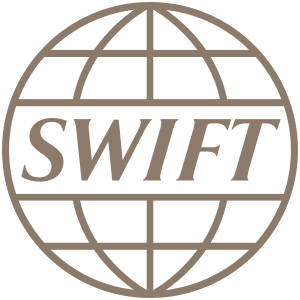Swift, the vital global financial network that western financial services companies, institutions and banks use for all payments and transfer billions of dollars every day, warned its customers yesterday evening that it was aware of cyber fraud and a number of recent "cyber incidents” where attackers had sent fraudulent messages over its system and $81 million was apparently stolen from a central bank.
 SWIFT (Wikipedia)
SWIFT (Wikipedia)
As reported by Reuters, the disclosure came as law enforcement agencies investigate the February cyber theft of $81 million from the Bangladesh central bank account at the New York Federal Reserve Bank. Swift has acknowledged that the scheme involved altering Swift software on Bangladesh Bank’s computers to hide evidence of fraudulent transfers.
Yesterday’s statement from Swift marked the first acknowledgement that the cyber attack on the New York Federal Reserve Bank was not an isolated incident but one of several recent criminal schemes that aimed to take advantage of the global messaging platform used by some 11,000 financial institutions.
“Swift is aware of a number of recent cyber incidents in which malicious insiders or external attackers have managed to submit Swift messages from financial institutions’ back-offices, PCs or workstations connected to their local interface to the Swift network,” the group warned customers.
The warning, which Swift issued in a confidential alert sent over its network, did not name any victims or disclose the value of any losses from the previously undisclosed attacks.
Swift, or the Society for Worldwide Interbank Financial Telecommunication, is a co-operative owned by 3,000 financial institutions. Also, Swift released a security update to the software that banks use to access its network to thwart malware that security researchers with British defense contractor BAE Systems said was probably used by hackers in the Bangladesh Bank heist.
Cyber security experts said more attacks could surface as SWIFT's banking clients look to see if their SWIFT access has been compromised.
Shane Shook, a banking security consultant who investigates large financial crime, said hackers were turning to SWIFT and other private financial messaging platforms because such attacks can generate more revenue than going after consumers or small businesses.
"These hacks specifically target financial institutions because smaller efforts result in much larger thefts," he said. "It's much more efficient than stealing from consumers."
Full Reuters article is here
We have for some time warned of the risks posed by cyber fraud and war to banks, savings and indeed investments. The apparent theft of $81 million from a central bank from an account at the New York Federal Reserve shows this.
Cyber theft is a real risk for all digital or virtual wealth today – whether that be digital bank accounts and deposits or electronic stock and other exchanges.
Fintech solutions involving the vitally important blockchain cometh and not before time. However, many of these solutions are also vulnerable in the short term as the nascent industry grows and the best solutions survive and thrive and less safe ones are slowly found out by the market and disappear.
The risks posed to bank deposits, markets and indeed all online investments and savings by hacking, cyberterrorism and cyberwar remains not understood.
Given these real risks, tangible gold becomes not important but a vital means of preserving wealth. Physical gold coins and bars, due to their tangible nature, are not vulnerable to crises that may afflict electronic digital currency and other digital wealth.
Those who hold physical gold and silver coins and bars outside the banking system as an insurance policy would certainly weather the storm better than those who do not.
The hope is that these risks will not materialise. Hope is not a strategy. We believe it is prudent to be aware of and take appropriate measures to protect your wealth.
Our modern western financial system with its massive dependency on single interface websites, servers and the internet faces serious risks that few analysts have yet to appreciate and evaluate. These also pose risks to digital gold providers who do not allow clients to interact and trade on the phone and are solely reliant on online trading platforms.
Jim Rickards, the leading expert on currency wars and risks posed by cyber fraud to people's, company's and indeed nation's wealth commented to GoldCore about the cyber theft:
"Bangladesh is one of the poorest countries in the world. $100 million of their money disappeared. The money was on deposit with the Federal Reserve Bank of New York, the safest bank in the world. The culprits hacked SWIFT, one of the most secure message traffic systems in the world. If the Fed and SWIFT aren't safe, nothing is safe. If Bangladesh had held physical gold, they would still have their money. The case for owning gold in an age of cyber-financial threats is compelling."
Recent Market Updates
Gold In London Vaults Beneath Bank of England Worth $248 Billion – BBC
Silver Prices Up 6% This Week and 25% YTD; Gold Up 1% This Week
Gold Price Set To Push Higher As Inflation Picks Up – RBC
Silver Bullion “Has So Much More to Give” – 5 Must See Charts Show
China Gold Bullion Yuan Trading To Boost Power In Gold and FX Markets
Marc Faber: “Messiah” Central Banks Helicopter Money Printing “Will Not End Well”
Gold News and Commentary
Gold ends higher ahead of central bank meetings (Marketwatch)
Gold climbs as dollar lends support ahead of Fed meeting (Reuters)
Gold Rises, Copper Falls as U.S. Home Sales Sag a Third Month (Bloomberg)
Sales of New U.S. Homes Fall for a Third Month on Slump in West (Bloomberg)
China debt load reaches record high as risk to economy mounts (FT via CNBC)
Macro picture sees precious metal shine (FT Adviser)
Gold, already on its way up, may head even higher: Technician (CNBC)
World Witnessed Socialism’s Death … Central Banking Is Next (Gold Seek)
Depression, Debasement, & 100 Years Of Monetary Mismanagement (Zero Hedge)
When will the Fed stop propping up the US stockmarket? (Money Week)
Read More Here
Gold Prices (LBMA)
26 April: USD 1,234.50, EUR 1,093.46 and GBP 847.28 per ounce
25 April: USD 1,230.85, EUR 1,094.08 and GBP 853.79 per ounce
22 April: USD 1,245.40, EUR 1,104.34 and GBP 868.73 per ounce
21 April: USD 1,257.65, EUR 1,113.21 and GBP 877.01 per ounce
20 April: USD 1,247.75, EUR 1,098.09 and GBP 867.45 per ounce
Silver Prices (LBMA)
26 April: USD 16.86, EUR 14.98 and GBP 11.67 per ounce (Not updated yet)
25 April: USD 16.86, EUR 14.98 and GBP 11.67 per ounce
22 April: USD 17.19, EUR 15.26 and GBP 11.96 per ounce
21 April: USD 17.32, EUR 15.31 and GBP 12.05 per ounce
20 April: USD 16.97, EUR 14.93 and GBP 11.81 per ounce
 |
 |
 |





0 comments:
Post a Comment